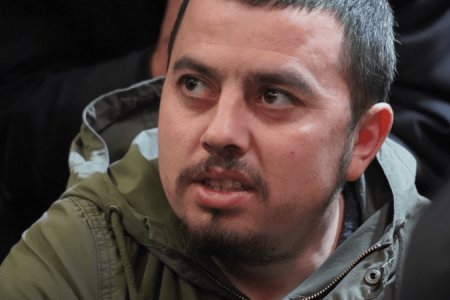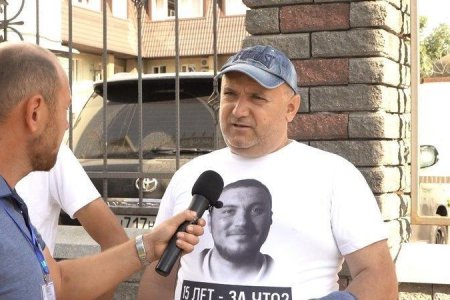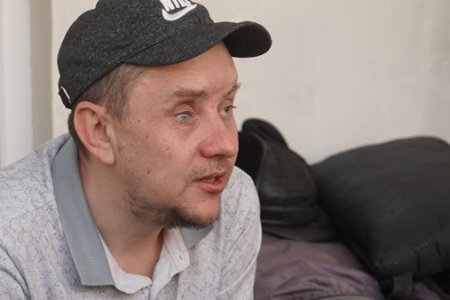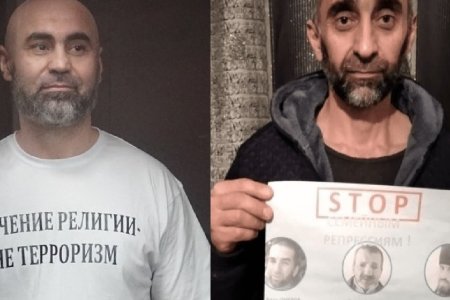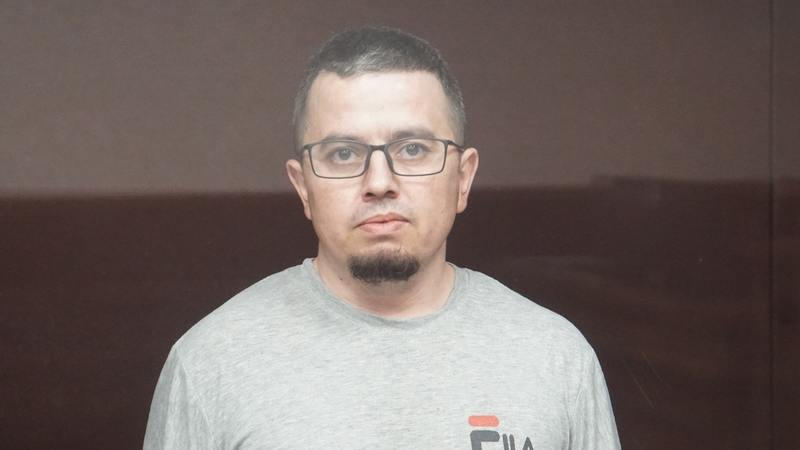
The military court of appeal in Vlasikha (Moscow region) has reduced the charge under Russia’s criminal code used to sentence Ernes Seitosmanov to 18 years’ imprisonment. By so doing, the judges effectively acknowledged that the entire case against the recognized political prisoner had been flawed, yet they lacked the courage to do more than knock six months off the sentence.
According to Seitosmanov’s lawyer, Alexei Ladin, the court ignored all of the defence’s evidence. This demonstrated, among other things, that all of the witnesses who testified under their own names retracted such testimony during the original trial and explained that they had only given it because the FSB had threatened to arrest them if they didn’t. The only ‘witness’ who did not retract his words was the individual who was allowed, without any legitimate grounds, to appear as a ‘secret’ or anonymous witness. Virtually all of Russia’s ‘trials’ of Crimean Tatar and other Ukrainian political prisoners hinge on the claims made by such ‘secret witnesses’ whose testimony cannot be verified, and who generally only ‘remember’ details that parrot the indictment. In this case, Ladin points out, you could hear that the individual (who sits in different premises, speaking by video link) was turning sheets of paper. Ladin believes it likely that enforcement offices were prompting this supposed ‘witness’ on how to answer the defence’s questions. He notes that at one point you can hear the witness get flustered and say clearly “I can’t see a thing”. The defence demanded that a check be carried out as to whether the man was alone in the room. This was purportedly carried out, but the defence remain convinced that the ‘secret witness’ was not alone. Nor, of course, would there have been any reason for him to be shuffling papers if he had been a real witness and not simply saying what he had been instructed to say. The use of such secret witnesses has been condemned by the UN’s Secretary General in his 2021 report on occupied Crimea and is in violation of a European Court of Human Rights judgement. The UN report expressed concern about the role of the courts, with judges regularly blocking defence questions aimed at demonstrating that these alleged witnesses are not telling the truth.
The defence had also asked for forensic examinations. A second linguistic assessment was needed since the first had been carried out with infringements, with the supposed ‘expert’ unable during questioning to provide any sensible answers to legitimate questions. A fingerprint examination was also needed as Seitosmanov and the defence are adamant that the brochures claimed to have been found in Seitosmanov’s home were, in fact, planted by the officers carrying out the ‘search’. Given such allegations, it was clearly necessary to ascertain whether Seitosmanov had handled this ‘prohibited religious literature’ claimed to have been found in his home, yet both applications were turned down.
Despite a sentence significantly longer than those that Russian courts pass against people convicted of violent crimes, even murder, Ernes Seitosmanov was never accused of any recognizable crime. The charges against him, under Russia’s flawed ‘terrorism’ legislation are linked solely with unproven allegations of involvement in Hizb ut-Tahrir and a flawed, and probably politically motivated, ruling passed in 2003 by Russia’s supreme court. This declared Hizb ut-Tahrir, ‘terrorist’, although the peaceful pan-Islamic movement is not known to have carried out acts of terrorism or violence anywhere in the world. Hizb ut-Tahrir is also legal in Ukraine, making Russia’s use of such charges against Crimean Tatar and other Ukrainian Muslims in occupied Crimea a particularly cynical violation of international law, which expressly prohibits an occupying state from applying its legislation on occupied territory).
Since 2014 Russia has intensified its persecution, and the length of sentences passed against Muslims on charges of involvement in Hizb ut-Tahrir, with such charges in occupied Crimea used as a weapon against the Crimean Tatar human rights movement. No proof of actual crimes is required, with the 2003 supreme court ruling treated as sufficient justification for prosecution under the ‘terrorism’ Article 205.5 of Russia’s criminal code. Nor is any proof of real involvement in Hizb ut-Tahrir needed, as the FSB regularly plant ‘prohibited religious literature’ and use secret witnesses who are either FSB agents or are people who have been tortured or threatened into collaborating with ‘the investigators’. The FSB also have their own ‘experts’ whom they can rely upon to provide whatever assessment is required, with the judges in these cases essentially always providing the sentences demanded of them.
The one significant distinction up till now has been whether a person is charged with the more serious Article 205.5 § 1 (‘organizing a supposed Hizb ut-Tahrir group) or 205.5 § 2 (‘involvement’ in this alleged group). In occupied Crimea, the FSB invariably adds Article 278, ‘planning to violently overthrow the Russian constitutional order’. That additional charge is based on the same fictitious ‘evidence’ as the first but justifies the imposition of even longer sentences. Although sometimes the more serious charge is laid as reprisals, for example, in the case of Raim Aivazov, who refused to be silent about the torture he was subjected to, often the decision as to who is considered an ‘organizer’ seems quite arbitrary. It does, however, usually make a difference of up to six or seven years in terms of the size of sentence. Ernes Seitosmanov was arrested on the more serious charge, and it was this that he was convicted of on 24 May 2023, by ‘judges’ Vitaly Mamedov (presiding), Maksym Nikitin and Magomedbasir Shuaipov from the Southern District Military Court in Rostov (Russia). He was sentenced to 18 years’ harsh regime imprisonment, with the first four years to be in a prison, the very worst of Russia’s penal institutions.
On 1 November 2023, a panel of appeal court judges under Vladimir Ivanovich Serebryansky ruled that the criminal code had been wrongly applied and changed the charge from paragraph 1 (‘organizer’) to paragraph 2 (‘involvement’). Had the lesser of the charges been applied from the outset, the sentence could have been 12 years. Instead, Serebryansky & Co. were probably worried about ‘annoying the FSB’ if they significantly reduced the sentence and reduced it only slightly – to 17.5 years (rather than 18) and 3 years (not 4) in a prison.
The FSB like to make their lives easy and one of the methods they use is to persecute several members of the same family. Armed searches were first carried out at the home of Ernes and his brother Enver Seitosmanov in January 2015. On that occasion, it was Ernes Seitosmanov who was their target, yet he was not arrested. The arrests that were made at that time were something of a test run, with the FSB securing repeat ‘trials’ of the person designated ‘organizer’ (Ruslan Zeytullaev) until they got a 15-year sentence, but ‘allowing’ the other three sentences to be much lower than the norm. Had Ernes Seitosmanov and his brother been arrested then, the same ‘guilty’ verdicts would have been guaranteed, but the sentences shorter. Instead, Enver Seitosmanov was arrested in May 2018 and was ‘sentenced on 5 December 2019 17 years in a harsh-regime prison colony. That sentence, also based solely on innocuous conversations, and on the ‘testimony’ of so-called secret (anonymous) witnesses, was upheld on 16 April 2020.
Ernes Seitosmanov had reacted to the mounting repression against Crimean Tatars under Russian occupation by attending political trials, either in occupied Crimea, or at the Southern District Military Court in Rostov, and had faced harassment and administrative prosecutions for such peaceful civic activism. The FSB came for him at 4 a.m. on 9 February 2022. Four civic activists were arrested that same day, including Ansar Osmanov (b. 1975). The charges against both Ernes and Osmanov were based on an illicitly taped conversation between them about religious and Russian persecution. The two men were tried separately, although this would make no sense had their conversation genuinely proven any involvement, together, in Hizb ut-Tahrir. Ansar Osmanov received a 20-year sentence on 18 June 2023, with this still awaiting appeal.
